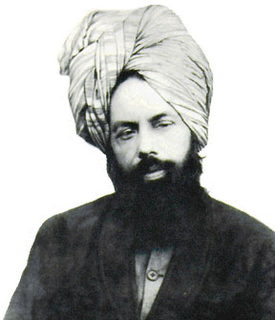“So dear friends! since it is the Sunnatullah, from times immemorial, that God Almighty shows two Manifestations so that two false joys of the opponents be put to an end, it is not possible now that God should relinquish His old-established Sunnat. So do not be grieved on what I have said to you; and nor your hearts should be distressed. For it is essential for you to see the second Manifestation, too, and its coming is better for you because it is everlasting the continuity of which will not end till the Day of Judgment.” (The Will – (Al-Wasiyyat); Page 5, Written on 24th December 1905).
 Based on certain writings by the Promised Massih (as) in the last century concerning the future of the Divine Mission he was to leave behind, and the subsequent interpretative understandings on the same proffered within the Jamaat-e-Ahmadiyya to deepen Its institutional order, most Ahmadis had been taught to consider that the present Nizam-e-Jamaat or the Ahmadiyya establishment- led by the assembly-elected Khalifatul Massih- system, is nothing less than ‘Qudrat-e-Saniah’ (Second Manifestation of Divine Power), mentioned by the Promised Massih (as). With the Divine decision to raise a Messenger to guide all humanity in the person of Khalifatullah Hazrat Munir Ahmad Azim Saheb (atba) of Mauritius; the claims of the Nizam-e-Jamaat-e-Ahmadiyya concerning Qudrat-e-Saniah (the lofty station of Divine favour), are increasingly looking a little shaky. Many Ahmadi youths are raising their spiritual concerns. Fundamental questions on the meaning and 'selective' interpretation of profound concepts like ‘Qudrat-e-Saniah’, are no longer off the table. Inquisitive about the Divine Manifestation in Mauritius in the blessed person of Hazrat Muhyi-ud-Din Al Khalifatullah Munir Ahmad Azim Saheb (atba), Ahmadi brothers in India are wondering now as to how to adjust their ‘received/ conventional wisdom’ in the Jamaat-e-Ahmadiyya concerning Divine favours (Qudrat-e-Saniah) so as to appreciate the great manifestation of
‘Qudrat’ that is before them.
Based on certain writings by the Promised Massih (as) in the last century concerning the future of the Divine Mission he was to leave behind, and the subsequent interpretative understandings on the same proffered within the Jamaat-e-Ahmadiyya to deepen Its institutional order, most Ahmadis had been taught to consider that the present Nizam-e-Jamaat or the Ahmadiyya establishment- led by the assembly-elected Khalifatul Massih- system, is nothing less than ‘Qudrat-e-Saniah’ (Second Manifestation of Divine Power), mentioned by the Promised Massih (as). With the Divine decision to raise a Messenger to guide all humanity in the person of Khalifatullah Hazrat Munir Ahmad Azim Saheb (atba) of Mauritius; the claims of the Nizam-e-Jamaat-e-Ahmadiyya concerning Qudrat-e-Saniah (the lofty station of Divine favour), are increasingly looking a little shaky. Many Ahmadi youths are raising their spiritual concerns. Fundamental questions on the meaning and 'selective' interpretation of profound concepts like ‘Qudrat-e-Saniah’, are no longer off the table. Inquisitive about the Divine Manifestation in Mauritius in the blessed person of Hazrat Muhyi-ud-Din Al Khalifatullah Munir Ahmad Azim Saheb (atba), Ahmadi brothers in India are wondering now as to how to adjust their ‘received/ conventional wisdom’ in the Jamaat-e-Ahmadiyya concerning Divine favours (Qudrat-e-Saniah) so as to appreciate the great manifestation of
‘Qudrat’ that is before them.
In
his Friday Sermon of 29 May 2009, Imam-
Jamaat Ul Sahih Al Islam Hazrat Muhyi-ud-Din Al Khalifatullah
Munir Ahmad Azim Sahib (atba) of Mauritius spoke
on Qudrat-e-Saniah, clearly explaining
the meaning and correct interpretation of this profound concept for our times. For
the benefit of all Ahmadi brothers, we reproduce the relevant extract
below:
In
his will (Al Wasiyyat),
Hazrat Mirza Ghulam Ahmad (as) has elaborated that after his death
his community would be assisted by a second manifestation of divine
power and support, just as it was assisted by a first manifestation
during his life. The Ahmadi brothers have interpreted this ‘second
power’ to mean the establishment of their Khilafat.
My
reply to this, the Promised Messiah (as) has come to continue the
work of Hazrat Muhammad (sa) – work which has been trampled by the
so-called Muslim scholars or Ulemas. Then, in order to accomplish
that work, the manifestation of the power of God takes place, as it
says in the Holy Quran:
“This
day have I perfected for you your religion and completed My favour
upon you.”
Its
manifestation took place in the time of the Holy Prophet Muhammad
(sa). But after him, this continued in the times of his caliphs (four
right-guided caliphs), revivers of faith, or Mujjadidin. They were
all the ‘second power’. The ‘second
power’ cannot be limited to a particular form.



